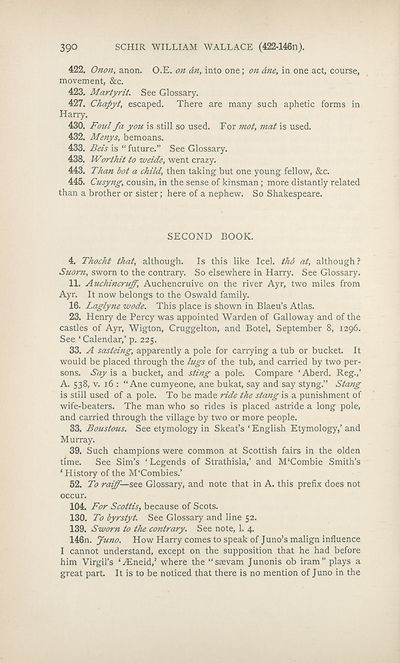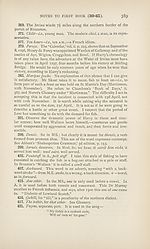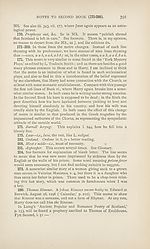Scottish Text Society publications > Old series > Actis and deidis of the illustere and vailzeand campioun, Schir William Wallace, Knicht of Ellerslie
(456) Page 390
Download files
Complete book:
Individual page:
Thumbnail gallery: Grid view | List view

390
SCHIR WILLIAM WALLACE (422-146n).
422. Onon, anon. O.E. on an, into one; on dne, in one act, course,
movement, &c.
423. Martyrit. See Glossary.
427. Chapyt, escaped. There are many such aphetic forms in
Harry.
430. Foul fa you is still so used. For mot, mat is used.
432. Menys, bemoans.
433. Beis is “ future.” See Glossary.
438. Worthit to weide, went crazy.
443. Than hot a child, then taking but one young fellow, &c.
445. Cusyng, cousin, in the sense of kinsman; more distantly related
than a brother or sister; here of a nephew. So Shakespeare.
SECOND BOOK.
4. Thocht that, although. Is this like Icel. tho at, although?
Suorn, sworn to the contrary. So elsewhere in Harry. See Glossary.
11. Auchincruff, Auchencruive on the river Ayr, two miles from
Ayr. It now belongs to the Oswald family.
16. Laglyne wode. This place is shown in Blaeu’s Atlas.
23. Henry de Percy was appointed Warden of Galloway and of the
castles of Ayr, Wigton, Cruggelton, and Botel, September 8, 1296.
See ‘ Calendar,’ p. 225.
33. A sasteing, apparently a pole for carrying a tub or bucket. It
would be placed through the lugs of the tub, and carried by two per¬
sons. Say is a bucket, and sting a pole. Compare ‘ Aberd. Reg.,’
A. 538, v. 16 : “ Ane cumyeone, ane bukat, say and say styng.” Stang
is still used of a pole. To be made ride the stang is a punishment of
wife-beaters. The man who so rides is placed astride a long pole,
and carried through the village by two or more people.
33. Boustous. See etymology in Skeat’s ‘ English Etymology,’ and
Murray.
39. Such champions were common at Scottish fairs in the olden
time. See Sim’s ‘ Legends of Strathisla,’ and M'Combie Smith’s
‘ History of the M'Combies.’
52. To raif—see Glossary, and note that in A. this prefix does not
occur.
104. For Scottis, because of Scots.
130. To byrstyt. See Glossary and line 52.
139. Sworn to the contrary. See note, 1. 4.
146n. Juno. How Harry comes to speak of Juno’s malign influence
I cannot understand, except on the supposition that he had before
him Virgil’s ‘^Eneid,’ where the “saevam Junonis ob iram” plays a
great part. It is to be noticed that there is no mention of Juno in the
SCHIR WILLIAM WALLACE (422-146n).
422. Onon, anon. O.E. on an, into one; on dne, in one act, course,
movement, &c.
423. Martyrit. See Glossary.
427. Chapyt, escaped. There are many such aphetic forms in
Harry.
430. Foul fa you is still so used. For mot, mat is used.
432. Menys, bemoans.
433. Beis is “ future.” See Glossary.
438. Worthit to weide, went crazy.
443. Than hot a child, then taking but one young fellow, &c.
445. Cusyng, cousin, in the sense of kinsman; more distantly related
than a brother or sister; here of a nephew. So Shakespeare.
SECOND BOOK.
4. Thocht that, although. Is this like Icel. tho at, although?
Suorn, sworn to the contrary. So elsewhere in Harry. See Glossary.
11. Auchincruff, Auchencruive on the river Ayr, two miles from
Ayr. It now belongs to the Oswald family.
16. Laglyne wode. This place is shown in Blaeu’s Atlas.
23. Henry de Percy was appointed Warden of Galloway and of the
castles of Ayr, Wigton, Cruggelton, and Botel, September 8, 1296.
See ‘ Calendar,’ p. 225.
33. A sasteing, apparently a pole for carrying a tub or bucket. It
would be placed through the lugs of the tub, and carried by two per¬
sons. Say is a bucket, and sting a pole. Compare ‘ Aberd. Reg.,’
A. 538, v. 16 : “ Ane cumyeone, ane bukat, say and say styng.” Stang
is still used of a pole. To be made ride the stang is a punishment of
wife-beaters. The man who so rides is placed astride a long pole,
and carried through the village by two or more people.
33. Boustous. See etymology in Skeat’s ‘ English Etymology,’ and
Murray.
39. Such champions were common at Scottish fairs in the olden
time. See Sim’s ‘ Legends of Strathisla,’ and M'Combie Smith’s
‘ History of the M'Combies.’
52. To raif—see Glossary, and note that in A. this prefix does not
occur.
104. For Scottis, because of Scots.
130. To byrstyt. See Glossary and line 52.
139. Sworn to the contrary. See note, 1. 4.
146n. Juno. How Harry comes to speak of Juno’s malign influence
I cannot understand, except on the supposition that he had before
him Virgil’s ‘^Eneid,’ where the “saevam Junonis ob iram” plays a
great part. It is to be noticed that there is no mention of Juno in the
Set display mode to: Large image | Zoom image | Transcription
Images and transcriptions on this page, including medium image downloads, may be used under the Creative Commons Attribution 4.0 International Licence unless otherwise stated. ![]()
| Permanent URL | https://digital.nls.uk/107006011 |
|---|
| Description | A collection of over 100 Scottish texts dating from around 1400 to 1700. Most titles are in Scots, and include editions of poetry, drama, and prose by major Scottish writers such as John Barbour, William Dunbar, Gavin Douglas, and George Buchanan. Edited by a key scholarly publisher of Scotland's literary history, and published from the late 19th century onwards by the Scottish Text Society. Available here are STS series 1-3. |
|---|

